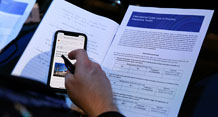Cyber Law Toolkit Presents Annual Update Including an Overview of National Positions, Invites New Submissions
On 22 September 2021, Dr Kubo Mačák, the General Editor of the Cyber Law Toolkit, introduced its annual update at the CyberCon conference in Brno, Czech Republic. The Toolkit is an established go-to resource for professionals and scholars working on international law and cyber operations.
The Toolkit‘s core asset are hypothetical scenarios, each of which contains a description of realistic cyber incidents inspired by real-world examples and accompanied by detailed legal analysis written in an accessible language.
Five new scenarios, a new functionality providing an overview of national positions on international law in cyberspace, and several new real-life incidents are among this year’s additions introduced today.
The new scenarios contemplate malicious cyber operations against medical facilities and vaccine research, explore international law implications of misattribution in cyberspace, consider the differences between means and methods of warfare in cyberspace, and analyse the legal ramifications of internet shutdowns.
The Toolkit now also contains a wholly new feature, which provides a customizable overview of all available national positions on international law and cyber operations. Users can search for specific countries or compare different States’ views on a diverse range of topics such as sovereignty, non-intervention, or due diligence.
To keep pace with the recent developments in the cyber security domain and remain a relevant source for practitioners and scholars alike, the Toolkit is updated regularly on the basis of internal research and through external submissions. It is now inviting submissions for the 2022 general update.
Full text of the call with submission dates and contacts is available for download here: Cyber Law Toolkit – call for submissions 2021.
The project is currently supported by the following partner institutions: the Czech National Cyber and Information Security Agency (NÚKIB), the International Committee of the Red Cross (ICRC), the NATO Cooperative Cyber Defence Centre of Excellence (CCDCOE), the University of Exeter, United Kingdom, the U.S. Naval War College, United States, and Wuhan University, China.

